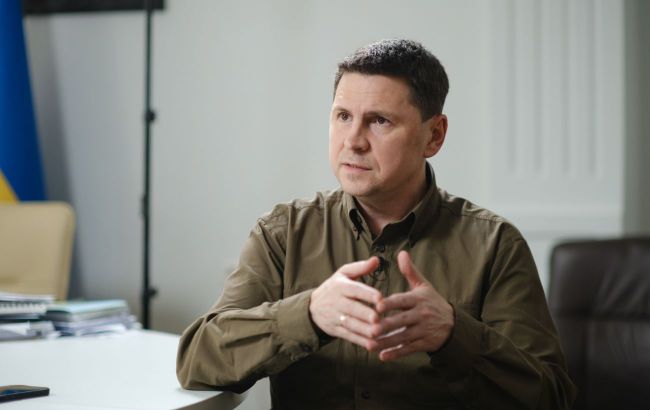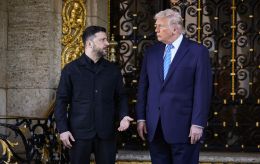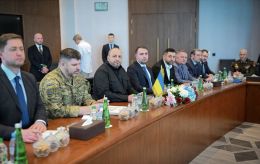There is no negotiation process with Russia as such at present — Presidential Office
 Photo: Advisor to the Head of the Office of the President Mykhailo Podolyak (Vitalii Nosach, RBC-Ukraine)
Photo: Advisor to the Head of the Office of the President Mykhailo Podolyak (Vitalii Nosach, RBC-Ukraine)
As of today, there is no negotiation process between Ukraine and Russia. The aggressor country is not ready for a ceasefire, states Mykhailo Podolyak, advisor to the Head of the Office of the President of Ukraine, in a comment to RBC-Ukraine’s YouTube channel.
"And here I move on to the negotiation process as such. At present, it clearly does not exist. Russia is not ready to end the war. Russia is not ready for a ceasefire. Russia is not ready for genuine negotiations. Russia can be forced into the negotiation process," Podolyak said.
According to him, this requires sanction measures of a prohibitive nature and scaling up Ukraine’s military capability to strike Russian territory.
"If this does not happen, then Russia will continue the war and will undoubtedly only increase the scale of its expansion in various forms onto the territory of the European continent. Not only is Ukraine under threat today, but also other countries. We see that Russia is deploying there residual — and I emphasize again, limited — resources, which are not abundant in Russia, along its northern borders," the advisor noted.
He emphasized that Finland and Estonia are very important for Russia because of control over the Baltic Sea waters. Russia is also very interested in controlling the Suwałki Gap, as it allows significant influence over the European continent, particularly Northern Europe.
"And again, returning to the negotiation process: indeed, for Ukraine, the negotiation process primarily matters from a humanitarian perspective — prisoner exchanges on a 1,000-for-1,000 basis twice, and exchanges of bodies. Although just a few days ago, Russia literally used the topic of body exchanges for yet another propaganda hysteria," Podolyak added.
According to the advisor to the Head of the Office of the President, this propaganda had no effect on Ukraine or Europe, but Russia continues to engage in such crude tactics and will keep doing so. Meanwhile, decisions on exchanges are still being made, verified, and carried out within established procedures.
"The second important aspect of the negotiation process for Ukraine is, so to speak, to clarify who is who in this war today. We remember that countries primarily from the Global South and the United States during Trump’s administration constantly emphasized the need to sit at the negotiating table because that’s where the solution lies. Russia supposedly ‘wants’ the negotiation process, while Ukraine supposedly ‘does not want’ it. We recall the Brazil formula, the China formula, the Türkiye formula, and so on," he said.
Podolyak stressed that the negotiation process, which had two rounds in Türkiye, clearly confirmed Russia’s unwillingness to sit at the negotiating table and end the war, or at least begin political settlement, other than by putting forward unrealistic, ultimatum-like demands.
At the same time, he emphasized that Ukraine, on the contrary, showed itself quite differently, especially to the countries of the Global South.
"Ukraine is ready for the negotiation process, Ukraine is ready to end the war, Ukraine is ready for political and diplomatic settlement. This is important from that perspective. But you are right, there is no real negotiation process. And if there is no pressure, Russia will continue to use the negotiation platform simultaneously for propaganda campaigns, as Medinsky does, while increasing the number of strikes against Ukraine’s civilian population," the advisor said.
Ukraine-Russia negotiations
On June 2, Ukraine and Russia held the second round of peace talks. During the meeting, the parties agreed to carry out another exchange of prisoners and bodies of fallen soldiers.
Earlier, Russia refused to agree to a ceasefire with Ukraine for at least 30 days without additional conditions. This idea was proposed by the United States.
During the second round of negotiations in Istanbul, Russia handed Ukraine its memorandum, which in fact turned out to be an ultimatum.
Specifically, the aggressor country demands that Ukraine begin withdrawing troops from the Donetsk, Luhansk, Zaporizhzhia, and Kherson regions in order to cease fire.
At the same time, as stated by the Ukrainian Ministry of Foreign Affairs, it is currently too early to talk about any preparations for a third round of negotiations between Ukraine and Russia. The lack of sufficient international pressure on Moscow blocks political progress.
As Ukrainian President Volodymyr Zelenskyy noted, Russia disliked all the peace initiatives offered to it and must be held accountable for this.

